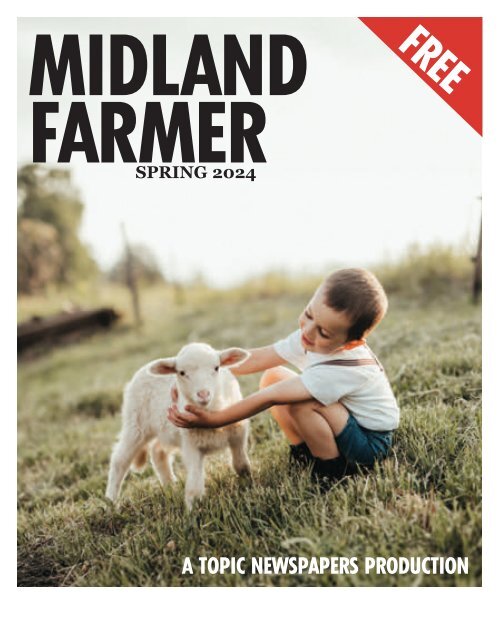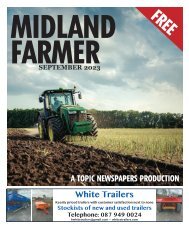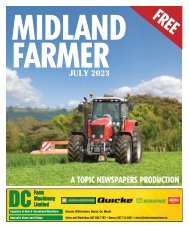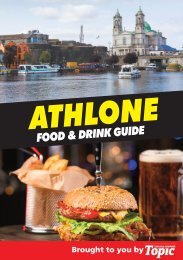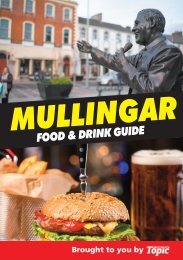Midland Farmer - Spring 2024
You also want an ePaper? Increase the reach of your titles
YUMPU automatically turns print PDFs into web optimized ePapers that Google loves.
MIDLAND<br />
FREE<br />
FARMER<br />
SPRING <strong>2024</strong><br />
A TOPIC NEWSPAPERS PRODUCTION
2 MIDLAND FARMER<br />
<strong>Spring</strong> <strong>2024</strong><br />
Reactors,<br />
restrictions<br />
and costs<br />
all rise in<br />
2023<br />
Virtually all key figures<br />
under the<br />
bovine TB Eradication<br />
Programme saw<br />
increases in 2023,<br />
with the number of<br />
reactors and herd<br />
restrictions seeing<br />
notable increases on<br />
2022.<br />
The amount of money<br />
spent by the state on the<br />
programme also increased<br />
– by about €17 million<br />
– in the same period,<br />
while the herd incidence<br />
rate also went up, reaching<br />
almost 5% by the close<br />
of 2023.<br />
New data released publicly<br />
by the Department of<br />
Agriculture, Food and the<br />
Marine shows that, in the<br />
12-month period from<br />
January 1, 2023, to December<br />
31, 2023, 28,868 TB test<br />
reactions were detected in<br />
cattle, compared to 23,337<br />
in the same 12-month<br />
period of 2022.<br />
On the same time period<br />
comparison, 2023 saw<br />
5,078 herds locked up with<br />
TB, compared to 4,492 in<br />
2022.<br />
The herd incidence rate<br />
as of December 31 last<br />
was 4.89%. This is the<br />
highest herd incidence<br />
rate at the close of a year<br />
since before 2010 (the Central<br />
Statistics Office does<br />
not provide data from<br />
before that year).<br />
Food and live animal exports<br />
worth over €14.5bn in 2023<br />
The value of Irish food<br />
and live animals exports<br />
in 2023 stood at over €14.5<br />
billion, according to the<br />
Central Statistics Office<br />
(CSO).<br />
This marks a slight drop<br />
of 1.2% when compared to<br />
the 2022 figure of €14.76<br />
billion.<br />
The value of meat and<br />
meat preparation exports<br />
dropped from €4.8 billion<br />
to €4.6 billion.<br />
Exports of dairy products<br />
and birds’ eggs were<br />
worth just over €4 billion,<br />
down from €4.3 billion in<br />
the previous year.<br />
The data shows that<br />
value of cereal and cereal<br />
preparation exports increased<br />
from €705 million to<br />
€769 million, while live<br />
animal exports grew in<br />
value from €605 million in<br />
2022 to €782 million last<br />
year.<br />
Analysis by the national<br />
statistical office also highlights<br />
the key destinations<br />
for food and live animal<br />
exports from Ireland.<br />
Last year, exports of food<br />
and live animals to Britain<br />
were worth €3.9 billion<br />
(2022: €3.87 billion), while<br />
for Northern Ireland such<br />
Charlie Burns Agri Consultants<br />
& Carton Rural Consultants<br />
ACRES Training Course <strong>2024</strong><br />
Dinner &<br />
Refreshments<br />
Served<br />
exports rose from €1.69 billion<br />
to €1.75 billion.<br />
Over €5.1 billion worth of<br />
food and live animals was<br />
exported to other EU countries<br />
(down from €5.4 billion<br />
in 2022), while the<br />
exports to the US stood at<br />
€774 million.<br />
CHINA<br />
China was the destination<br />
for €566 million worth<br />
of exports of food and live<br />
animals in 2023 and there<br />
was also more than €2.3<br />
billion of similar exports<br />
€156 For Attending<br />
Granard Mart<br />
WEEKDAYS &<br />
SATURDAYS<br />
Mandatory for all ACRES participants<br />
to “the rest of world”<br />
(2022: €2.5 billion).<br />
IMPORTS<br />
The CSO said that<br />
imports of food and live<br />
animals to Ireland<br />
increased in value last<br />
year to just over €10 billion<br />
and must be completed by 31st December <strong>2024</strong><br />
(2022: €9.5 billion).<br />
There was a slight<br />
increase in the value of<br />
imports of meat and meat<br />
preparations to €1.17 billion<br />
while the value of<br />
dairy products and birds’<br />
eggs imports dropped by<br />
€99 million to just over €1<br />
billion.<br />
Imports of cereal and<br />
cereal preparation were<br />
up slightly to €1.7 billion,<br />
while imports of vegetables<br />
and fruit rose by €237<br />
million to €1.68 billion.<br />
In 2023, imports of food<br />
and live animals from<br />
Britain rose in value from<br />
€2.2 billion to €2.4 billion,<br />
while for Northern Ireland<br />
such imports dropped<br />
in value by around €40<br />
million to €1.3 billion.<br />
Over €4.1 billion worth of<br />
food and live animals was<br />
exported to other EU countries<br />
(up from €3.6 billion<br />
in 2022), while the exports<br />
to the US stood at €422 million.<br />
Ireland imported food<br />
and live animals worth<br />
€118 million from China,<br />
and such imports from<br />
“the rest of world” were<br />
valued at €1.57 billion.<br />
Commenting on the<br />
Other Venues<br />
• Mullingar<br />
• Kinnegad<br />
• Ballinasloe<br />
Goods Exports and<br />
Imports December 2023<br />
report, Ciarán Counihan,<br />
statistician in the CSO<br />
international trade in<br />
goods division, said:<br />
“In 2023, Ireland’s<br />
exports of goods were €197<br />
billion, a decrease of more<br />
than €11 billion when compared<br />
with 2022. Exports<br />
in 2023 were still more<br />
than €30 billion higher<br />
than in 2021.<br />
“Imports of goods in 2023<br />
were more than €139 billion,<br />
€1.5 billion lower<br />
than the 2022 level, but<br />
almost €36 billion higher<br />
than in 2021.<br />
“The unadjusted exports<br />
for December 2023 were<br />
valued at €13.9 billion, a<br />
decrease of €1.4 billion on<br />
December 2022. Seasonally<br />
adjusted exports were<br />
€15.7 billion in December<br />
2023.<br />
“In December 2023, unadjusted<br />
imports were valued<br />
at almost €12 billion.<br />
When seasonally adjusted,<br />
imports of goods fell by<br />
€1.7 billion when compared<br />
with November<br />
2023.”<br />
Book your place via mobile<br />
numbers below<br />
Charlie 086 831 5622<br />
James 086 248 8708<br />
Eoin 087 142 6603<br />
Mark 087 433 1904<br />
Eanna 087 112 1326
<strong>Spring</strong> <strong>2024</strong><br />
Nitrates decision will impact<br />
generational renewal – Macra<br />
Young farmers view time,<br />
data and science as critical<br />
elements to Ireland’s<br />
nitrates derogation and<br />
want greater integration<br />
with generational<br />
renewal policy, according<br />
to Macra.<br />
These elements were outlined<br />
at a Joint Oireachtas<br />
Committee hearing on the<br />
nitrates derogation<br />
attended by a Macra delegation<br />
of president, Elaine<br />
Houlihan; agricultural<br />
affairs chair, Dr. Liam Hanrahan;<br />
and Dr. Maria Snell,<br />
senior research and policy<br />
executive.<br />
Commenting following<br />
the meeting, Houlihan said:<br />
“The upcoming discussions<br />
and decisions around<br />
nitrates and water quality<br />
by the Departments of<br />
Agriculture and Environment,<br />
and ultimately the<br />
EU’s decision around Ireland<br />
nitrates derogation,<br />
will have long-term implications<br />
for young farmer<br />
generational renewal.<br />
“We need far more consideration<br />
for generational<br />
renewal in nitrates and<br />
water quality policy.<br />
“Young farmers are ultimately<br />
the frontline environmentalists<br />
and are<br />
already committed to progressive<br />
environmental<br />
stewardship on water quality.”<br />
“These same young farmers<br />
are now met with potentially<br />
economically<br />
devastating consequences<br />
surrounding the nitrates<br />
derogation decisions,”<br />
Houlihan added.<br />
She has argued that the<br />
point needs to be made that<br />
continuous increases in<br />
minimum standards for<br />
environmental protection<br />
is not the most effective<br />
way to encourage best practices.<br />
“Instead of potentially<br />
driving young farmers off<br />
the land with reductionist<br />
strategies, we need to<br />
encourage more young<br />
trained farmers into our<br />
industry and allow them to<br />
contribute to future environmental<br />
stewardship,”<br />
she stated.<br />
ICMSA has represented farm families from Offaly and<br />
all over the <strong>Midland</strong>s at local, national, and European<br />
level with diligence and an emphasis on finding<br />
solutions to their problems that has been our<br />
trademark for over 70 years.<br />
We’re the specialist family farm organisation and have<br />
an unrivalled record of sound analysis and a focus on<br />
farm incomes.<br />
We are organised by - and work for – farmers.<br />
And only farmers.<br />
Chairperson of Offaly ICMSA: Michael Guinan, Rahan, 086-8766851<br />
Secretary of Offaly ICMSA: Pat O’Brien, Corndarragh, 087-2714091<br />
Local Member Relations Officer: Alan Armstrong, Kinnity, 087-4795185<br />
ICMSA Head Office: John Feely House, Dublin Road, Limerick<br />
(Tel) 061-314677, or info@icmsa.ie<br />
Please also look at our website at www.icmsa.ie<br />
Liam Hanrahan added:<br />
“we need to follow the science<br />
and measures must be<br />
given the appropriate timeframe<br />
to have an impact on<br />
water quality with lag<br />
times between change of<br />
practice on farm and water<br />
quality improvement being<br />
properly acknowledged and<br />
taken into account.<br />
“The need for more specific<br />
farm appropriate data<br />
to evidence the effectiveness<br />
of the on-farm measures<br />
and capture the mitigation<br />
currently in place<br />
would help complement the<br />
Teagasc Agricultural<br />
Catchments Programme<br />
and evidence the positive<br />
impact of the introduction<br />
of changes in various farming<br />
practices on water quality.<br />
“This is a critical component<br />
as it is this evidence<br />
which will impact on Irelands<br />
derogation,” he<br />
added.<br />
The chair emphasised<br />
that Macra believes in a science-based<br />
approach to the<br />
nitrates derogation backed<br />
up by advisory and on-farm<br />
programmes such as Agricultural<br />
Sustainability<br />
Support and Advisory Programme<br />
(ASSAP) to deliver<br />
on behavioural change to<br />
improve water quality.<br />
Concluding, the Macra<br />
president said: “To deliver<br />
positive environmental outcomes<br />
for water quality<br />
into the future, the policy<br />
environment needs to be<br />
mindful of encouraging<br />
and supporting young<br />
trained farmers to enter<br />
farming and bring with<br />
them new approaches and<br />
technologies to benefit the<br />
environment.”<br />
BRENNAN’S<br />
Tarmac Contractors<br />
• Driveways<br />
• Paths<br />
• Farm Lanes<br />
• Tennis Courts<br />
Machine<br />
• Lay Tar<br />
• Kerbing<br />
• All Ground Works<br />
Contact Feichin at<br />
Mobile 087 6744651<br />
Phone 044 9331806<br />
www.brennanstarmac.ie<br />
• COMPETITIVE PRICES<br />
• NO OBLIGATION QUOTATIONS<br />
• C2 REGISTERED<br />
MIDLAND FARMER<br />
3<br />
Aldi meat price<br />
decreases<br />
described as<br />
‘unrealistic’<br />
The Irish Cattle and<br />
Sheep <strong>Farmer</strong>s’<br />
Association (ICSA)<br />
has hit out at supermarket<br />
chain, Aldi<br />
for claiming that its<br />
latest round of meat<br />
price cuts will not<br />
impact on the prices<br />
paid to any of its<br />
suppliers.<br />
ICSA Beef chair John<br />
Cleary said: “This is a<br />
ludicrous claim. Aldi’s<br />
assertion that their price<br />
cuts will not affect their<br />
suppliers is simply unacceptable<br />
and out of touch<br />
with the reality faced by<br />
Irish farmers.<br />
“It is our assertion that<br />
cutting the prices of Irish<br />
beef and lamb directly<br />
undermines the efforts<br />
and livelihoods of Irish<br />
cattle and sheep farmers,”<br />
he said.<br />
Cleary made the comments<br />
following Aldi’s<br />
announcement this week<br />
that it would be reducing<br />
prices on a range of products,<br />
including Irish beef<br />
and lamb.<br />
The ICSA chair continued:<br />
“Our beef and lamb<br />
producers are producing<br />
top-quality food to<br />
extremely exacting standards<br />
and they are doing<br />
so under serious financial<br />
pressures.<br />
“In most instances<br />
farmers are struggling<br />
just to meet the bare minimum<br />
costs of production.<br />
“It is incredulous to<br />
suggest that slashing<br />
prices on products that<br />
are already undervalued<br />
would not have a detrimental<br />
impact on suppliers,”<br />
he said.<br />
The ICSA has claimed<br />
that Aldi’s actions will<br />
“almost certainly” provoke<br />
a round of price cutting<br />
by other retailers on<br />
key farm products and<br />
this “will all feed back<br />
into downward pressure”<br />
on prices paid to producers.<br />
Cleary continued:<br />
“Quite simply, at a time<br />
when production costs<br />
have skyrocketed, this<br />
move by Aldi only serves<br />
to diminish the value of<br />
these products further by<br />
perpetuating unrealistic<br />
expectations regarding<br />
how low prices can plummet.<br />
“There can be no doubt<br />
that the downward pressure<br />
on these prices will<br />
inevitably trickle down<br />
the food chain and will<br />
ultimately burden beef<br />
and lamb farmers who<br />
have always had the least<br />
bargaining power.”<br />
MULLINGAR<br />
AGRI STORE<br />
Mullingar Bus. Pk,<br />
Mullingar<br />
Tel. 044 934 7440<br />
For all your agri feed<br />
and hardware needs<br />
Suppliers of pet food<br />
Open<br />
Monday - Friday 9-6pm<br />
Saturday 9-1pm<br />
Call in to<br />
view our<br />
large range<br />
of stock<br />
in our<br />
extended shop
4 MIDLAND FARMER<br />
<strong>Spring</strong> <strong>2024</strong><br />
DAFM now accepting BISS applications for <strong>2024</strong> Young Offaly<br />
The Department of Agriculture,<br />
Food and the Marine (DAFM) has<br />
today opened the application<br />
process for the <strong>2024</strong> Basic Income<br />
Support for Sustainability<br />
(BISS).<br />
The department said that it is<br />
also now accepting applications for<br />
Complementary Redistributive<br />
Income Support for Sustainability<br />
(CRISS), Eco-Schemes and the<br />
other related schemes. The closing<br />
date for BISS applications in <strong>2024</strong> is<br />
Wednesday, May 15, <strong>2024</strong>.<br />
Under the new Common Agricultural<br />
Policy (CAP), the Basic Payment<br />
Scheme (BPS) has been<br />
replaced by the BISS. According to<br />
the department, the new scheme is<br />
“designed to provide a direct<br />
income support to Irish farmers to<br />
underpin their continued sustainability<br />
and viability”.<br />
The maximum payment that will<br />
be granted to any one farmer under<br />
the BISS, in any one scheme year is<br />
capped at an effective rate of<br />
€66,000. No payment will be made<br />
under the BISS where the amount<br />
is less than €100.<br />
DAFM said that farmers will<br />
receive a BISS information pack in<br />
the post over the coming days. The<br />
pack contains a Health and Safety<br />
Authority (HSA) leaflet along with<br />
a BISS help sheet, an Area Monitoring<br />
System (AMS) leaflet, maps,<br />
cover letter and a statement of<br />
lands.<br />
“This information will assist<br />
farmers and their advisors to make<br />
their online application,” the<br />
department said.<br />
The department has urged farmers<br />
and advisors “to avail of the<br />
early opening of the application<br />
process now rather than waiting<br />
until nearer the closing date”.<br />
<strong>Farmer</strong>s can apply for all elements<br />
of direct payments (BISS,<br />
Eco-Schemes, Complementary<br />
Income Support for Young <strong>Farmer</strong>s,<br />
Protein Aid, National Reserve,<br />
transferring of entitlements)<br />
online.<br />
According to DAFM, this helps to<br />
ensure that it can “process all<br />
applications under these schemes<br />
as efficiently as possible”.<br />
<strong>Farmer</strong>s are being reminded to<br />
check that they have correctly<br />
applied for the Areas of Natural<br />
Constraints (ANC) and Eco-<br />
Scheme, if applicable.<br />
The department said that annual<br />
payment claims for the Straw<br />
Incorporation Measure (SIM),<br />
Agri-Climate Rural Environment<br />
Scheme (ACRES) and the Organic<br />
Farming Scheme (OFS) can also be<br />
made online.<br />
In the case of ACRES Tranche 2<br />
applicants, access to the BISS application<br />
system will be made available<br />
on a gradual basis over the<br />
coming weeks, as approvals issue<br />
and as the required updates to mapping<br />
systems are made.<br />
<strong>Farmer</strong>s who want to contact the<br />
department in relation to online<br />
application they can do so by calling<br />
049 4368288 in relation to<br />
queries on registering for<br />
www.agfood.ie – for example<br />
queries on lost passwords, how to<br />
register etc.<br />
057 8674422 in relation to queries<br />
on completing the BISS application<br />
once registered on www.agfood.ie<br />
or to request a paper copy of the<br />
terms and conditions.<br />
farming student<br />
wins 2023 John<br />
Feely Scholarship<br />
Offaly farming student, Michael Tully, receiving a<br />
John Feely Foundation Scholarship cheque for<br />
€1500 from ICMSA President, Denis Drennan, in<br />
the specialist dairy organisation’s Head Office in<br />
Limerick earlier this month. Accompanying Eoin<br />
to the presentation was his father, Joe.<br />
A young man from<br />
Fivealley, Birr, has<br />
been awarded one of<br />
the country’s most<br />
prestigious farm<br />
scholarships.<br />
Michael Tully was<br />
one of the four recipients<br />
of the 2023 John<br />
Feely Foundation<br />
Scholarships hosted at<br />
their Limerick head<br />
office by ICMSA and<br />
the Association’s President,<br />
Denis Drennan.<br />
Mr Drennan said the<br />
standard of the applicants<br />
overall was very<br />
encouraging and that of<br />
the four individuals<br />
concerned was outstanding.<br />
“The standard<br />
we’re seeing in the<br />
young dairy farmers<br />
coming through bodes<br />
well for the sector:<br />
they’re technically<br />
very strong and environmentally<br />
aware,<br />
they’re also committed<br />
to building on the standards<br />
already achieved.<br />
ICMSA is delighted to<br />
be associated with the<br />
John Feely Scholarship<br />
programme and we’ll<br />
be getting out the<br />
details for the <strong>2024</strong><br />
awards programme in<br />
due course and we’d<br />
welcome applications<br />
from the dairy families<br />
of Offaly and all over<br />
our <strong>Midland</strong>s membership<br />
base,” he said.<br />
Mullingar Equine<br />
Vets Ltd.<br />
Michael O’Donoghue<br />
MVB MRCVS<br />
Padraig O’Reilly MVB<br />
& Associates<br />
EQUINE PRACTICE<br />
1A Brosna Bus.<br />
Pk., Lynn Road, Mullingar<br />
T: 044 934 8142<br />
E: info@mevets.ie
<strong>Spring</strong> <strong>2024</strong><br />
Ireland ranks 8 out of 14 EU<br />
countries for sustainable progress<br />
Ireland has ranked in<br />
eighth place out of 14 comparable<br />
EU countries in<br />
this year’s Sustainable<br />
Progress Index report<br />
released last Tuesday, February<br />
20 by Social Justice<br />
Ireland.<br />
The report entitled ‘Measuring<br />
Progress: Sustainable<br />
Progress Index <strong>2024</strong>’ ranked<br />
14 comparable EU countries<br />
based on their delivery of<br />
the UN’s Sustainable Development<br />
Goals (SDGs).<br />
Sweden ranked the highest<br />
for sustainable progress<br />
index ratings, followed by<br />
Denmark; Netherlands; Finland;<br />
Austria; Germany;<br />
Luxembourg; Ireland; Belgium;<br />
France; Portugal;<br />
Italy; Spain; and Greece. The<br />
report looked at 17 SDGs,<br />
with 83 indicators overall<br />
and covered the social, economic<br />
and environmental<br />
aspects of sustainability<br />
reflected in Agenda 2030.<br />
Ireland ranked at number<br />
nine out of the 14 countries<br />
in the economy section. On<br />
the social index, Ireland is in<br />
the middle of the ranking, in<br />
7th place.<br />
Ireland ranked 11th on the<br />
environment index, according<br />
to the report.<br />
The score has improved on<br />
some environmental SDGs,<br />
such as on SDG 11 ‘sustainable<br />
cities and communities’.<br />
However, “poor performance”<br />
can be seen on goals<br />
relating to water quality,<br />
affordable and clean energy,<br />
responsible production and<br />
consumption, and climate<br />
change, according to the<br />
report.<br />
Ireland ranked 11th for<br />
clean water and sanitation;<br />
14th for affordable and clean<br />
energy; second for sustainable<br />
cities and communities;<br />
10th for responsible consumption<br />
and production;<br />
ninth for climate action;<br />
eight for life below water;<br />
and seventh for life on land.<br />
Research and policy analyst<br />
with Social Justice Ireland,<br />
Michelle Murphy said:<br />
“At the midpoint of the<br />
implementation of the 2030<br />
agenda, a reality check<br />
reveals significant challenges<br />
are still evident in<br />
meeting some of the environment<br />
goals.<br />
“Ireland is still seriously<br />
underperforming in areas<br />
such as affordable energy,<br />
clean water, innovation and<br />
infrastructure, gender<br />
equality, and sustainable<br />
agriculture.<br />
“This is dragging our overall<br />
ranking down even<br />
though we are performing<br />
well in some areas. We are<br />
failing to balance core essentials<br />
such as economic and<br />
social progress, sustaining<br />
the planet’s environment<br />
and resources and combatting<br />
climate change.” .<br />
MIDLAND FARMER<br />
9% increase in people<br />
working in agriculture<br />
The number of people<br />
employed in the<br />
agriculture, forestry<br />
and fishing sector<br />
increased by around<br />
9% in the fourth<br />
quarter (Q4) of 2023<br />
when compared to<br />
the same period in<br />
the previous year.<br />
That is according to<br />
the latest Labour<br />
Force Survey published<br />
last Thursday,<br />
February 22 by the<br />
Central Statistics<br />
Office (CSO).<br />
The figures show<br />
that 112,900 people<br />
were employed in the<br />
sector in Q4 2023<br />
which is up by 9,300<br />
year-on-year.However,<br />
it is down from the<br />
114,700 working in the<br />
sector in the previous<br />
quarter.<br />
Agriculture,<br />
forestry and fishing<br />
was among the economic<br />
sectors that<br />
saw the largest percentage<br />
increase yearon-year<br />
in people<br />
employed. The CSO<br />
data shows that 97,500<br />
males aged between<br />
15 and 89 years were<br />
employed in the agriculture,<br />
forestry and<br />
fishing sector in Q4<br />
2023.<br />
This is up from<br />
86,000 in the corresponding<br />
quarter in<br />
2022, but is down<br />
slightly on Q3 2023<br />
when 97,300 males<br />
were working in the<br />
sector. 15,400 females<br />
were working in agriculture,<br />
forestry and<br />
fishing in Q4 2023,<br />
which is down by<br />
over 2,000 when compared<br />
with the same<br />
period in the previous<br />
year (17,600).<br />
The southwest was<br />
the region with the<br />
highest number of<br />
people employed in<br />
agriculture, forestry<br />
and fishing at 24,500.<br />
This was followed by<br />
the border region<br />
(19,200), the southeast<br />
(16,900) and the west<br />
(15,000).<br />
Overall, the<br />
CSO<br />
data<br />
shows<br />
that the<br />
number of<br />
people aged 15-89<br />
years in<br />
employment<br />
stood at<br />
2,706,400 in<br />
Q4 2023. This<br />
marks an<br />
increase of<br />
5<br />
3.4% or 89,600 more<br />
people in work when<br />
compared to 12<br />
months earlier.<br />
The employment<br />
rate for people aged<br />
15-64 years was 74%<br />
in Q4 2023. There<br />
were 117,700 unemployed<br />
people aged 15-<br />
74 years in the period,<br />
giving an unemployment<br />
rate of 4.2%, up<br />
from 4.1% in Q4 2022.<br />
The unemployment<br />
rate among those<br />
aged 15-24 years (the<br />
youth unemployment<br />
rate) was 9.4% in Q4<br />
2023, up from 9.1% in<br />
Q4 2022. There were<br />
29,500 people in longterm<br />
unemployment<br />
(unemployed for 12<br />
months or longer) in<br />
Q4 2023 . This was a<br />
decrease of 4,900<br />
people from Q4<br />
2022.
6 MIDLAND FARMER<br />
<strong>Spring</strong> <strong>2024</strong><br />
DAFM: Over 50,000t<br />
of organic feed<br />
needed next winter<br />
Government accused of lack of<br />
support towards dairy sector<br />
Minister of State at the Department of Agriculture,<br />
Food and the Marine, Pippa Hackett<br />
announced last Tuesday, February 20 that<br />
over 50,000 tonnes of organic feed is needed to<br />
meet requirements for next winter <strong>2024</strong>/2025.<br />
The minister made the announcement on the<br />
back of the results of an organic feed survey<br />
that indicates “growing demand” for organic<br />
feed of all types.<br />
A total of 912 organic farmers participated in<br />
the survey, which is approximately 25% participation<br />
rate among the cohort of farmers in<br />
organics before the <strong>2024</strong> intake.<br />
Based on the replies, it is estimated that overall<br />
demand for concentrates will be in the region<br />
of 33,000 tonnes.<br />
Demand could be in the region of 20,000 tonnes<br />
for straights, 6,000 tonnes for protein crops (such<br />
as a pea/barley mix), and for 50,000 bales of fodder.<br />
Minister Hackett said: “Organics and tillage<br />
have been highlighted in FoodVision as an<br />
opportunity for farmers.<br />
“These results show the growing demand for<br />
organic feed and the opportunity to increase the<br />
area of organic tillage in Ireland. There is an<br />
opportunity for an organic Irish mill as the sector<br />
continues to grow.”<br />
The survey took place against the background<br />
of a significant increase in organic farmer numbers<br />
and area over the past couple of years.<br />
<strong>Farmer</strong> numbers doubled to 4,000 in 2023, with<br />
another 1,000 farmers joining the Organic Farming<br />
Scheme in <strong>2024</strong>.<br />
Organic land will reach 5% of overall agricultural<br />
area in <strong>2024</strong>, and is well on target to<br />
achieve 10% by 2030, as set out in Ireland’s Climate<br />
Action Plan.<br />
The chair of the Irish<br />
<strong>Farmer</strong>s’ Association<br />
(IFA) Dairy Committee<br />
has accused the government<br />
of a lack of support<br />
for the dairy sector.<br />
Stephen Arthur said that<br />
farmers with herds of<br />
between 40-60 cows are<br />
under pressure to comply<br />
with regulations coming<br />
from the European Union,<br />
particularly around nitrates<br />
and water quality.<br />
“We have a department of<br />
agriculture that seems to<br />
be willing to carry out the<br />
instructions of European<br />
policy.<br />
“They seem to be a pro-<br />
European policy department<br />
and they don’t<br />
understand the consequences<br />
of these policies<br />
inside the farm gate.<br />
“You take a guy there<br />
with 60 cows and he has<br />
everything done, everything<br />
proper. He has to<br />
gather up maybe 10, 12 or 14<br />
acres to keep his cows, to<br />
keep where he is, and he<br />
has to pay €330-400/ac for it,<br />
just to hold onto what he<br />
has,” he told farming website<br />
Agriland.<br />
Arthur said that the dairy<br />
farm is the “main fabric of<br />
rural Ireland” but it is<br />
being “obliterated” by government<br />
policy.<br />
“Teagasc has shown that<br />
reducing the stocking rate<br />
from 250kg [N per ha] to<br />
220kg will have very little,<br />
if any, impact on water<br />
quality. Yet it has a massive<br />
impact on farm incomes,<br />
especially the smaller<br />
farms,” Arthur added.<br />
He also said that farmers<br />
are annoyed about the environmental<br />
impact of a possible<br />
25% increase in<br />
passenger numbers at<br />
Dublin Airport which is<br />
currently being considered<br />
by council planners.<br />
“<strong>Farmer</strong>s are quite<br />
aggrieved over this. They<br />
feel that the dairy cow is<br />
paying for everything.<br />
“They’re paying for the<br />
expansion of the cap in<br />
Dublin Airport, they’re<br />
also paying for the rectifying<br />
of water quality and<br />
getting to the [emissions]<br />
levels for greenhouse gases<br />
(GHGs),” he said.<br />
The IFA chair said that<br />
dairy farmers should be<br />
able to avail of grants of<br />
70% under the Targeted<br />
Agriculture Modernisation<br />
Schemes (TAMS) for<br />
enhanced slurry storage<br />
facilities.<br />
“Rather than making<br />
more regulations to make<br />
more people non-compliant,<br />
let’s do a system to get<br />
everybody compliant, get<br />
the capacity built up where<br />
we can manage the nutrients<br />
on the farms,” he said.<br />
In order for farmers to<br />
keep calves on farms<br />
longer, Arthur said they<br />
should be allowed to claim<br />
VAT back on calf feeders<br />
and drafting units, while<br />
farmers rearing calves<br />
should be paid €100/animal.<br />
He added that carbon<br />
taxes should be used to<br />
incentivise the early<br />
slaughter of cattle.<br />
Arthur said that 2022 was<br />
a particularly successful<br />
year in Irish dairy farming<br />
with an average income of<br />
over €150,000. However,<br />
since then milk prices have<br />
tumbled from record highs<br />
against the backdrop of<br />
volatile global markets.<br />
“That’s my fear that we<br />
had one really good year<br />
and based on one year’s<br />
economics we are going to<br />
devise the policy of dairy<br />
farming going forward in<br />
the future. I think that’s<br />
wrong.<br />
“Look at this year, we’ve<br />
farmers there with big cash<br />
flow issues, income is way<br />
down,” Arthur said.<br />
“<strong>Farmer</strong>s have €1.2 billion<br />
euro invested and borrowed<br />
on their farms,<br />
interest rates are gone<br />
through the roof. They’re<br />
constantly spending just to<br />
hold on to where they are.<br />
“It’s frustrating for any<br />
farmer that’s out there. The<br />
two kinds of phone calls<br />
we’re getting is the guy<br />
who cannot get the land to<br />
rent because he can’t compete<br />
in the market and the<br />
other guy who just wants to<br />
get out,” he added.<br />
DAIRY EXIT SCHEME<br />
The IFA Dairy chair said<br />
there is a “strong appetite”<br />
among farmers for a dairy<br />
reduction or exit scheme.<br />
However, he believes that<br />
Minister for Agriculture<br />
Charlie McConalogue may<br />
not bring such a measure<br />
forward.<br />
“Why would he bring in a<br />
scheme when he’s taking<br />
the cows out for nothing,<br />
his policies are taking the<br />
cows out for nothing. Why<br />
would you put money into a<br />
scheme when you have a<br />
tool, a blunt object called<br />
the nitrates directive?<br />
“The dairy milk cheque<br />
has been so important to<br />
small rural communities<br />
the length and breadth of<br />
the country, European policy<br />
is just slowly eroding<br />
that,” Arthur explained.<br />
“The policies that they<br />
are bringing in, it’s just<br />
destroying the rural communities<br />
of milking cows,<br />
of family farms.<br />
“We’ve a [farmer] age profile<br />
heading for 60 years of<br />
age. In five or six years’<br />
time I can see lots of dairy<br />
farmers gone out of business.<br />
They don’t want to be<br />
there, they’re tired of milking<br />
cows and want to get<br />
out,” he added.<br />
STEPHEN<br />
LYNN & CO<br />
<br />
Chartered Tax Advisers &<br />
Financial Services Provider<br />
to the farming &<br />
business community<br />
Chartered Certified<br />
Accountants &<br />
Registered Auditors<br />
KENNETH<br />
DUNLEAVY<br />
ENGINEERING<br />
Specialising in manufacturing and<br />
erecting steel agricultural buildings<br />
and steel industrial buildings<br />
throughout Westmeath.<br />
Fully equipped steel engineering<br />
workshop, fabrication of all types of<br />
steel buildings undertaken.<br />
Advice on agricultural building<br />
planning regulations and building<br />
grants available to the agricultural<br />
sector.<br />
Farm & Industrial Buildings<br />
- Mobile Welding<br />
All types of steel supplied<br />
- Welded & Erected<br />
Brady Livestock<br />
HAULAGE<br />
Provide National<br />
Transport<br />
of Cattle<br />
Martry, Kells, Co. Meath<br />
Phone: 087 263099<br />
046 9029890<br />
Zone C, Mullingar Business Park,<br />
Mullingar, Co Westmeath<br />
info@stephenlynn.ie<br />
www.stephenlynn.ie<br />
044 9333772 • 044 9345452<br />
Fully insured. VAT registered.<br />
Call Kenneth: 086 387 4317<br />
Your call is important to me. If I can’t answer<br />
the phone, please send a text or<br />
WhatsApp message.<br />
Ballinalack, Mullingar, Co. Westmeath<br />
T: 086 803 4395 • E: finnan.john@live.com
<strong>Spring</strong> <strong>2024</strong><br />
MIDLAND FARMER<br />
ICBF improving genotyping programme after farmer concerns<br />
The Irish Cattle Breeding<br />
Federation (ICBF)<br />
has said that it is making<br />
a number of<br />
improvements to the<br />
National Genotyping<br />
Programme (NGP) in<br />
response to concerns<br />
raised by farmers.<br />
The NGP is a collaborative<br />
initiative enabling<br />
Ireland to take the first<br />
step in achieving a fully<br />
genotyped national herd.<br />
The programme, administered<br />
by the Irish Cattle<br />
Breeding Federation<br />
(ICBF), is based on a costsharing<br />
model between<br />
the Department of Agriculture,<br />
Food and the<br />
Marine (DAFM), the beef<br />
and dairy industry and<br />
participating farmers.<br />
The first year of the fiveyear<br />
programme (2023),<br />
with a budget of €23 million,<br />
is being funded<br />
entirely through the<br />
Brexit Adjustment<br />
Reserve (BAR) fund.<br />
GENOTYPING<br />
PROGRAMME<br />
In a statement issued<br />
last Tuesday, February 20,<br />
ICBF said that over<br />
127,000 passports have<br />
been issued to date under<br />
the programme, which is<br />
now in its eighth week. It<br />
said that the current average<br />
length of time that a<br />
sample spends in the laboratory<br />
is 4.5 days. 98% of<br />
calf samples are spending<br />
less than 7 days in the lab.<br />
“The 2% that are taking<br />
longer than 7 days are<br />
understandably causing<br />
some frustration among<br />
farmers,” it added.<br />
ICBF said that over<br />
87,000 calf samples under<br />
the NGP were received<br />
into the laboratory last<br />
week, with 20,000 samples<br />
received in the post today<br />
alone.<br />
The average turnaround<br />
time from birth to passport<br />
being issued was 13.1<br />
days, it said.<br />
To date, ICBF said that<br />
over 230,000 calf samples<br />
received in the laboratory,<br />
with 151,246 calves samples<br />
genotyped. The latest<br />
data shows that 1.58% of<br />
samples received to date<br />
have been deemed as<br />
unsuitable or empty.<br />
In response to concerns,<br />
ICBF said that it will<br />
begin implementing a<br />
number of improvements<br />
to the programme, including<br />
automatically issuing<br />
a calf’s passport when the<br />
sample hits day 10 in the<br />
lab. Once this happens,<br />
the farmer should receive<br />
the passport in the post in<br />
the coming days. The<br />
genotype result will follow<br />
thereafter.<br />
“This should relieve any<br />
concerns about moving<br />
animals in a timely manner,”<br />
ICBF said.<br />
In the event that a sample<br />
is identified as unsuitable<br />
or empty, ICBF said<br />
that a passport will be<br />
issued automatically<br />
The farmer will be<br />
required to follow up with<br />
their tag company to<br />
order a new DNA button<br />
tag to resample the calf<br />
for its genomic evaluation.<br />
ICBF noted that<br />
some farmers have<br />
expressed concerns<br />
around receiving passports<br />
on different days,<br />
despite sending all samples<br />
together.<br />
“While this is a normal<br />
occurrence, we are<br />
endeavouring to reduce<br />
the incidence. Please rest<br />
assured that samples are<br />
being processed as<br />
quickly and efficiently as<br />
possible,” it said.<br />
DELAYS<br />
Meanwhile, Fine Gael<br />
Senator Tim Lombard has<br />
said that he has been contacted<br />
by around a dozen<br />
farmers in the NGP who<br />
are concerned the amount<br />
of time it is taking passports<br />
to come back to<br />
them.<br />
“Traditionally, when<br />
they [farmers] sent on the<br />
application form over the<br />
years, they’d get it back in<br />
three or four days. Talking<br />
to people now at the<br />
moment, you’re looking at<br />
a scenario that it could be<br />
anything up to two,<br />
maybe even three weeks<br />
in some locations.<br />
“One of the stories I<br />
heard last night was an<br />
individual with a male<br />
calf who was waiting 21<br />
days for the passport to<br />
come back and the genotyping<br />
came back as<br />
inconclusive and he has<br />
to go through the entire<br />
process again.<br />
“He was hoping to move<br />
that calf off to the mart<br />
and now he is in a scenario<br />
that he is kind of<br />
stuck in limbo in many<br />
ways,” Lombard said.<br />
The Cork-based senator<br />
said that it was important<br />
to ensure the system is<br />
7<br />
streamlined and there is<br />
adequate capacity in laboratories<br />
to carry out testing<br />
so farmers have the<br />
ability to trade calves. He<br />
noted that farmers have<br />
42 days to move calves off<br />
farm, otherwise they are<br />
required to carry out a<br />
bovine tuberculosis (bTB)<br />
test which would involve<br />
an additional cost.<br />
“That’s probably one of<br />
the big concerns that<br />
farmers have at the<br />
moment to make sure<br />
they gets passports back<br />
in a suitable period of<br />
time and then move that<br />
animal on,” he said.<br />
“We’re going to see the<br />
peak in calves probably<br />
the next 10 days. A large<br />
volume of samples are<br />
going to be tested.<br />
“We need to make sure<br />
that the capacity is in labs<br />
to make sure farmers get<br />
the passports back in<br />
time,” Lombard added.<br />
ICBF<br />
In his role as vice-chair<br />
of the Joint Oireachtas<br />
Committee on Agriculture,<br />
Food and the<br />
Marine, Senator Lombard<br />
said that he is seeking<br />
clarity on the current situation.<br />
The senator, who fully<br />
supports the National<br />
Genotyping Programme,<br />
has asked the committee<br />
to write to the ICBF to get<br />
an update on this issue.<br />
“I’m hoping now that<br />
the committee will agree<br />
to that proposal which<br />
would hopefully be very<br />
beneficial because farmers<br />
need information.<br />
“This is a really important<br />
scheme. This is to<br />
make sure that Ireland is<br />
going to be one of the drivers<br />
when it comes to<br />
genetics in the entire<br />
world but its about making<br />
sure farmer get information<br />
regarding this<br />
issue,” he said.<br />
SCALLY PRECAST<br />
PRODUCTS LTD<br />
Ballinalack, Mullingar<br />
Co. Westmeath<br />
SAW REPAIRS,<br />
SALES AND<br />
SHARPENING<br />
SERVICE<br />
• Wide and Narrow Bandsaws • Stellite Tipped<br />
Bandsaws • Routers Planer Knives • Round Baler<br />
Knives sharpened• Hedge Cutting Blades • Chainsaws<br />
• Mortice Chains • Carbide Tipped Blades<br />
• Lawnmowers • Sheep Shearing<br />
& Horse Clipping Blades<br />
Tel: 044 9371186 / Mob: 087 2613105<br />
E: info@whelansawmakers.ie<br />
W: www.whelansawmakers.ie<br />
WELDING SUPPLIES<br />
MOBILE WELDERS / GENERATOR SALES<br />
COMPRESSORS<br />
BELTS<br />
BEARINGS<br />
PULLEYS<br />
SEALS<br />
CHAINS<br />
HAND TOOLS<br />
SAFETY GEAR<br />
ZONE C, MULLINGAR BUSINESS PARK<br />
TEL: 044 93 41325<br />
WWW.KENDERBT.IE • INFO@KENDERBT.IE<br />
Call 085 735 5706<br />
pmdcladdingsupplies2023@gmail.com<br />
Stockists of Concrete<br />
Troughs and Cubicle Beds<br />
ALL GRANT APPROVED<br />
CATTLE SLATS<br />
6’6’’ TO 16’6’’<br />
PLUS AGITATION MANHOLES<br />
ALL GENERAL PRECAST<br />
Tel: 044 922 3211<br />
Mob: 087 793 3736<br />
Kilbeggan,<br />
Co. Westmeath
8 MIDLAND FARMER<br />
<strong>Spring</strong> <strong>2024</strong><br />
GDT price<br />
index<br />
average<br />
down 24%<br />
The average Global<br />
Dairy Trade (GDT)<br />
price index across<br />
2023 decreased by<br />
24% compared to<br />
2022, dipping to a<br />
five-year low of 850<br />
in August.<br />
The dairy commodity<br />
trading company’s<br />
annual report published<br />
last Thursday, 22 February<br />
shows that $2.4 billion<br />
was traded on GDT<br />
platforms in 2023.<br />
The main milk powders,<br />
whole milk powder<br />
(WMP) and skim milk<br />
powder (SMP) accounted<br />
for 80% of the quantity<br />
traded. Last year, GDT<br />
trading events recorded<br />
an average clearance rate<br />
of 91%. In 2023, GDT<br />
events facilitated the<br />
trade of 708,997MT of<br />
products from seven sellers,<br />
across three supply<br />
regions: Europe, Oceania,<br />
and the US.<br />
In total, there were 432<br />
bidders from 70 countries<br />
who took part in trading<br />
events with 515,018 lots<br />
being traded. The report<br />
shows that the 12-month<br />
average prices for SMP<br />
and WMP decreased by<br />
29% and 21% across 2023<br />
respectively when compared<br />
with the previous<br />
year.<br />
SMP dropped to a fouryear<br />
low in September<br />
and WMP fell to an eightyear<br />
low in August.<br />
Coleman Livestock<br />
WESTMEATH<br />
COME SELECT YOUR OWN<br />
TOP QUALITY WEST OF IRELAND<br />
STORES AND WEANLINGS - MALES &<br />
FEMALES<br />
Push for more ambitious EU<br />
food waste reduction targets<br />
MEPs on the European<br />
Parliament’s Environment<br />
Committee have<br />
pushed for more ambitious<br />
EU food waste<br />
reduction targets.<br />
Binding waste reduction<br />
targets by 2030 should be<br />
at least 20% in food processing<br />
and manufacturing<br />
and 40% per capita in<br />
retail, restaurants, food<br />
services and households,<br />
MEPs said.<br />
The latter would be in<br />
comparison to the annual<br />
average between 2020 and<br />
2022. In the EU, 60 million<br />
tonnes of food waste, or<br />
131kg per person, are generated<br />
annually.<br />
EU countries would need<br />
to ensure that these targets<br />
are achieved at<br />
national level by December<br />
31, 2030. However, Ireland<br />
already has a 50%<br />
food waste reduction target<br />
in place for 2030.<br />
Solutions to reduce food<br />
waste provided by the<br />
MEPs include promoting<br />
“ugly” fruits and vegetables,<br />
clarifying date<br />
labelling and donating<br />
unsold-but-consumable<br />
food. The food waste<br />
reduction targets proposed<br />
by the MEPs are<br />
higher then the ones proposed<br />
by the European<br />
Commission in its revision<br />
of the Waste Framework<br />
Directive.<br />
MEPs also want the commission<br />
to evaluate the<br />
possibility and make<br />
AIDAN<br />
DEMPSEY<br />
WATER WELL DRILLING<br />
Bracknagh, Co Offaly<br />
appropriate legislative<br />
proposals to introduce<br />
higher targets for 2035 of<br />
at least 30% and 50%<br />
respectively. The environment<br />
committee earlier<br />
this week adopted its position<br />
on the revision of the<br />
directive proposed by the<br />
commission by 72 votes to<br />
four, and three abstentions.<br />
The full parliament is<br />
scheduled to vote on its<br />
position during the plenary<br />
session next month.<br />
The file will be followed up<br />
by the new parliament<br />
after the EU elections on 6<br />
to 9.<br />
TEXTILE WASTE<br />
The proposed revision of<br />
the Waste Framework<br />
Directive also concerns<br />
textile waste. A total of<br />
12.6 million tonnes of textile<br />
waste are generated<br />
across the EU every year,<br />
EU figures show. Clothing<br />
and footwear account for<br />
5.2 million tonnes of<br />
waste, or 12kg of waste per<br />
person every year. It is<br />
estimated that less than<br />
1% of all textiles worldwide<br />
are recycled into new<br />
products.<br />
The new rules, as<br />
adopted by MEPs, would<br />
set up extended producer<br />
responsibility schemes<br />
through which economic<br />
operators placing textiles<br />
on the EU market would<br />
cover the costs for their<br />
separate collection, sorting<br />
and recycling.<br />
Under the parliament’s<br />
proposal, EU countries<br />
would need to ensure, by 1<br />
January, 2025, the separate<br />
collection of textiles for<br />
re-use, preparing for reuse<br />
and recycling. These<br />
rules would cover clothing<br />
and accessories, blankets,<br />
bed linen, curtains, hats,<br />
footwear, mattresses and<br />
carpets, including products<br />
that contain textilerelated<br />
materials such as<br />
leather, rubber or plastic.<br />
Harton's Sand & Gravel Suppliers<br />
of high quality Quarry Materials,<br />
serving the community for over<br />
80 years<br />
ALL<br />
STOCK<br />
VACCINATED<br />
& DOSED<br />
REMEMBER,<br />
GET THE<br />
STOCK YOU<br />
WANT, NOT<br />
THE STOCK<br />
YOU ARE<br />
GIVEN<br />
NATIONWIDE<br />
DELIVERY<br />
REFERENCES<br />
AVAILABLE<br />
MICHAEL: 087 674 2351<br />
• Water Well and Geothermal Borehole<br />
Drilling<br />
• Your own private water source<br />
• Geothermal Boreholes cost and energy<br />
efficient<br />
ONCE OFF PAYMENT<br />
NO ANNUAL WATER CHARGES<br />
Tel: 045 528981 / Mob: 087 2445685<br />
Email: aidandempseywelldrilling@yahoo.ie<br />
• Commercial<br />
• Residential<br />
• Civic<br />
• Industrial<br />
• Agriculture<br />
• Education<br />
086 256 4353<br />
Derrycloney, Mountmellick,<br />
Co Laois, Ireland R32 X9D9<br />
Suppliers of:<br />
(043) 668 1299<br />
Eircode: N91 XH58
<strong>Spring</strong> <strong>2024</strong><br />
Planning<br />
system for<br />
slurry storage<br />
‘completely<br />
clogged’<br />
The planning permission<br />
system for<br />
slurry storage is<br />
“completely clogged”<br />
at the moment, the<br />
Joint Oireachtas<br />
Committee on Agriculture,<br />
Food and the<br />
Marine has heard.<br />
The comment was<br />
made by the president<br />
of the Irish Creamery<br />
Milk Suppliers’ Association<br />
(ICMSA),<br />
Denis Drennan who<br />
addressed the committee<br />
yesterday<br />
recently.<br />
Drennan told the<br />
committee that there<br />
is currently a situation<br />
where “anybody<br />
and everybody” is in a<br />
position in which<br />
they can object planning<br />
permission for<br />
slurry storage.<br />
He said it is “completely<br />
ridiculous”<br />
that somebody “living<br />
300 miles away” can<br />
object planning based<br />
on the distance from a<br />
Special Protected<br />
Area (SPA) or Special<br />
Area of Conservation<br />
(SAC).<br />
Drennan said there<br />
is a “huge” number of<br />
non-governmental<br />
organisations (NGOs)<br />
in Ireland who are<br />
“making a full-time<br />
job out of objecting to<br />
farmers [doing] the<br />
right thing”.<br />
“On one hand part of<br />
their organisation is<br />
saying that farmers<br />
need to spread slurry<br />
at the right times and<br />
have the proper facilities<br />
in place.<br />
“Yet the other wing<br />
of the same organisation<br />
can be objecting<br />
and become serial<br />
objectors to people<br />
who want to do the<br />
right thing,” the<br />
ICMSA president told<br />
the committee.<br />
PLANNING FOR<br />
SLURRY STORAGE<br />
Drennan said that,<br />
at the moment, planning<br />
permission can<br />
take up to 18 months,<br />
even for “straightforward”<br />
cases, which he<br />
said is completely<br />
“unacceptable” for<br />
farmers.<br />
He added that the<br />
Targeted Agricultural<br />
Modernisation<br />
Scheme (TAMS 3) is<br />
also “clogged up”,<br />
stating that only 800<br />
of the over 2,500 applications<br />
for slurry<br />
storage are approved<br />
to date.<br />
Stressing that farmers<br />
“can’t have<br />
enough slurry storage”,<br />
Drennan said<br />
that it is the “ultimate<br />
goal” to be in a position<br />
to spread slurry<br />
when the weather<br />
conditions are<br />
favourable.<br />
If a farmer is in control<br />
of their slurry<br />
and spreads it at the<br />
most “optimal” time<br />
in terms of grass<br />
uptake, that is the<br />
“most effective” for<br />
farmers economically<br />
and the environment,<br />
he said.<br />
FAST TRACKING<br />
He said the planning<br />
system and TAMS<br />
need to be fixed, and<br />
fast tracking of planning<br />
and “maybe even<br />
planning exemptions”<br />
where farmers are<br />
building on existing<br />
farmyard is needed.<br />
“We can’t have a situation<br />
where getting<br />
planning permission<br />
can take up to 18<br />
months and to get<br />
approval for TAMS<br />
takes another nine or<br />
10 months,” Drennan<br />
said at the meeting.<br />
Under current<br />
TAMS rules, where<br />
farmers have less<br />
than the legally<br />
required slurry storage,<br />
they are ineligible<br />
for a TAMS grant<br />
for slurry storage or<br />
soiled water, the<br />
ICMSA said.<br />
The association is<br />
proposing that if<br />
farmers are below the<br />
legal requirement and<br />
wish to bring their<br />
slurry facilities up to<br />
20 weeks, for example,<br />
they would be<br />
required to pay the<br />
full cost up to the<br />
legal limit and would<br />
get grant aid thereafter.<br />
For example, if<br />
farmers have 15<br />
weeks storage in Zone<br />
A (16 weeks), they<br />
would pay for one<br />
weeks’ storage and<br />
would get grant aid on<br />
the additional four<br />
weeks, the ICMSA<br />
said.<br />
MIDLAND FARMER<br />
Calf registrations surplus 300,000 for <strong>2024</strong><br />
Calf registrations have now<br />
reached 314,424 head for <strong>2024</strong>,<br />
with 96,628 registered in the last<br />
week based on Irish Cattle Breeding<br />
Federation (ICBF) data.<br />
The data from ICBF applies to<br />
calves that were registered before<br />
16 February.<br />
This time last year, some 434,763<br />
head had been registered, which<br />
means that based on the data, registrations<br />
are down 120,339 compared<br />
to last year.<br />
CALF REGISTRATIONS<br />
Looking at the data, 268,888 calves<br />
have been registered to dairy dams<br />
– this is down 104,442 head on 2023.<br />
For this week, 87,906 calves were<br />
registered to dairy dams, which<br />
when compared to the same week<br />
last year is down 62,588.<br />
Some of the decrease may be due<br />
to the National Genotyping Programme,<br />
which is currently taking<br />
12.5 days for calves to be registered<br />
from tagging.<br />
Moving to the calves registered to<br />
beef dams, there have been 45,536<br />
calves registered so far this year.<br />
For the same period in 2023 some<br />
61,433 calves had been registered to<br />
beef dams, which means that numbers<br />
are down 15,897 head.<br />
For the week ending 16 February,<br />
a total of 96,628 calves were registered<br />
to dairy and beef dams –<br />
9<br />
which when compared to the same<br />
period in 2023 is down 68,608 head.<br />
For the same period in 2023, some<br />
165,236 had been registered to dairy<br />
and beef dams.<br />
GENOTYPING<br />
The National Genotyping Programme<br />
is in its first year, and as of<br />
13 February, more than 66,000 animal<br />
passports were issued via the<br />
programme.<br />
ICBF has stated that the programme<br />
is “progressing well” and<br />
that on average, it is taking 12.5<br />
days from birth to receiving the<br />
animal’s passport.<br />
Postage delays have been noted as<br />
an issue in the receiving of samples<br />
to the labs.<br />
However, in the programme’s<br />
information handbook, ICBF said<br />
that including postage, the whole<br />
process – from tagging to the issuing<br />
of animal passports, can take<br />
on average 10 to 12 days.<br />
For more, see page 7
10 MIDLAND FARMER<br />
<strong>Spring</strong> <strong>2024</strong><br />
ICMSA set out “essentials” for<br />
independence of Agriculture<br />
Appeals Review Panel<br />
Speaking in advance of addressing<br />
the Joint Committee for<br />
Agriculture, Food and Marine<br />
on the draft Bill to establish the<br />
Review Panel for Agriculture<br />
Appeals, ICMSA President Denis<br />
Drennan said that the independence<br />
of the Review Panel will<br />
be essential and that certain conditions<br />
were necessary if that<br />
independence was to be recognised<br />
and unquestioned.<br />
“Every year, ICMSA deals with<br />
members who have sanctions<br />
imposed on them under various<br />
Department of Agriculture, Food<br />
& Marine schemes and who appeal<br />
the decision. This is a hugely<br />
stressful process for many farmers<br />
with the loss of income amongst<br />
other issues and, in the context of<br />
the amendment being proposed, it<br />
is just essential that farmers have<br />
confidence in the new system and<br />
that the decisions taken are fair<br />
and reasonable. And to that end,<br />
ICMSA believes that several specific<br />
measures would greatly help<br />
instil that farmer confidence in<br />
the new regime,” said Mr Drennan.<br />
ICMSA believes it is essential<br />
that there is adequate farmer representation<br />
on the Review Panel.<br />
Under the proposed legislation,<br />
the Minister appoints members of<br />
the Review Panel, but there is no<br />
specific reference to farm representation<br />
on the panel. There are<br />
a number of precedents in relation<br />
to farmer representation on<br />
review panels that have operated<br />
fairly and reasonably. It is simply<br />
essential that there is farmer representation<br />
on this critical Review<br />
Panel.<br />
The Review Panel should have<br />
the power to set its own regulations<br />
while obviously respecting<br />
national and EU laws. Under the<br />
draft Bill, the Minister may set<br />
down regulations and ICMSA considers<br />
this to be a retrograde step.<br />
If the Review Panel is to be independent,<br />
it should have the power<br />
to set down its own rules and procedures<br />
and not be dictated to by<br />
the Minister of the day.<br />
The Review Panel should have<br />
the power to elect its own Deputy<br />
Chairperson and not by Ministerial<br />
appointment, as proposed in<br />
the draft legislation. A six-month<br />
timeframe for a decision on an<br />
appeal should be set down in the<br />
legislation.<br />
“At a time when farmers need to<br />
feel confidence that agricultural<br />
appeals will be heard fairly and<br />
relatively promptly, we urge the<br />
Minister and the Department to<br />
take on board these proposals and<br />
thus set out the independence of<br />
the Review panel in a way that is<br />
incontrovertible. We badly need to<br />
rebuild farmer confidence in the<br />
whole system of Government<br />
interaction with farmers from its<br />
present unsustainably low level,”<br />
said the ICMSA President.<br />
New suckler scheme expected<br />
to be rolled-out in July<br />
A reformed suckler<br />
scheme which is expected<br />
to have no upper limit on<br />
the number of weanlings/herd<br />
that will be eligible<br />
for payment is<br />
expected to be rolled out<br />
this July.<br />
The scheme will offer suckler<br />
farmers a payment of<br />
€50/weanling and the new<br />
scheme – which is still at the<br />
negotiation stage and has yet<br />
to be given a title – will<br />
replace the National Beef<br />
Welfare Scheme (NBWS).<br />
The NBWS was rolled out<br />
last year but had an upper<br />
limit of 40 calves.<br />
Testing for the presence of<br />
infectious bovine rhinotracheitis<br />
(IBR) in herds was<br />
one of the measures in the<br />
previous NBWS, however<br />
this measure is expected to<br />
be scrapped for the new<br />
€50/cow scheme this year.<br />
The scheme is expected to<br />
be available for all sucklerbred<br />
calves born between 1<br />
July, 2023 and 30 June, <strong>2024</strong>.<br />
Under the scheme, it is<br />
envisaged that a payment of<br />
€35/eligible calf will be<br />
available for a meal feeding<br />
measure, and an additional<br />
€15/eligible calf will be<br />
available for a vaccination<br />
measure.<br />
As well as the €50/weanling<br />
payment, an optional<br />
add-on of €400/herd is<br />
expected to be offered to<br />
assist suckler farmers in<br />
developing herd health<br />
plans. Before the details of<br />
the new scheme can be<br />
finalised, it will have to be<br />
approved by the Department<br />
of Public Expenditure and<br />
Reform.<br />
Over €14.2 million was paid<br />
to the 15,834 suckler farmers<br />
who participated in the<br />
NBWS in 2023.While any<br />
details of financial support<br />
will be positive news for<br />
farmers, the huge decline in<br />
the number of suckler-bred<br />
calves born in Ireland<br />
appears to be continuing.<br />
According to the Irish Cattle<br />
Breeding Federation<br />
(ICBF), the number of suckler<br />
bred calves registered in<br />
2023 fell by over 60,000 head.<br />
As of Friday, December 29,<br />
2023, just over 754,600 suckler<br />
bred calves had been registered<br />
compared to just<br />
under 815,000 head registered<br />
in 2022.<br />
A similar trend of declining<br />
registrations of suckler<br />
bred calves has also been<br />
seen in the opening few<br />
weeks of this year.<br />
Tom Darcy's<br />
Gala & Tyre<br />
Centre<br />
Daingean<br />
057 9353 048 / 53666<br />
087 251 9361<br />
087 9586 059<br />
darcytyres@gmail.com<br />
Rochfortbridge<br />
We offer a friendly and<br />
efficient service<br />
covering counties<br />
Westmeath and Offaly<br />
Highest prices<br />
guaranteed<br />
SPECIALIZING IN<br />
FARM LANDS<br />
Farms and<br />
Houses urgently<br />
required for sale.<br />
• 4 Wheel Alignment,<br />
• Alloy Repairs,<br />
• All types of Hydraulic Hoses<br />
• Tyres & Head Light Focusing<br />
• All agri and quad tyres<br />
• Stockists of all types of oil<br />
Small and large farms<br />
required in all areas<br />
for cash buyers.<br />
Phone 087 250 8626
<strong>Spring</strong> <strong>2024</strong><br />
The general secretary of<br />
the Irish Cattle and<br />
Sheep <strong>Farmer</strong>s’ Association<br />
(ICSA) has<br />
accused the European<br />
Commission of being<br />
“detached” from farmers.<br />
Eddie Punch made the<br />
comments at the Global<br />
Food Forum this week in<br />
Brussels which was<br />
organised by Farm<br />
Europe.<br />
The two-day event, taking<br />
place ahead of the<br />
European elections in<br />
June, called for the development<br />
of an ambitious<br />
European farm deal.<br />
Among those in attendance<br />
were EU Commissioner<br />
for Agriculture<br />
Janusz Wojciechowski,<br />
along with David Clarinval,<br />
deputy prime minister<br />
and Minister of<br />
Agriculture, Belgium,<br />
which currently holds the<br />
EU presidency.<br />
They were joined by key<br />
figures from EU institutions,<br />
national ministers,<br />
farm organisations and<br />
business leaders.<br />
In his response to the<br />
Commissioner Wojciechowski<br />
and the Belgian<br />
presidency of the<br />
EU, Eddie Punch took aim<br />
at the lack of engagement<br />
by the EU Commission<br />
with the farmers.<br />
“As we come to the end<br />
of another commission<br />
mandate, I look back at<br />
the last four-and-a-halfyears<br />
and I wonder how<br />
did it get so bad that the<br />
commission became so<br />
detached from the practitioners<br />
on the ground?<br />
“How is it that you have<br />
been expert in shadow<br />
consultation with keyboard<br />
warriors, but not<br />
listening or engaging in a<br />
real way with the practitioners<br />
on the ground?<br />
“You know this now<br />
because you see the tractors<br />
on the streets. But<br />
you should not have to be<br />
shocked and surprised.<br />
“The farmers are angry<br />
all over Europe at the confluence<br />
of policies that<br />
have shown disrespect for<br />
the people who put food<br />
on the table,” he said.<br />
Punch told the conference<br />
that farmers are<br />
being asked to do more on<br />
sustainability, biodiversity<br />
and climate change<br />
while being expected to<br />
continue to produce food<br />
“at prices that are not sustainable<br />
economically”.<br />
“We have had a crisis of<br />
inflation and input costs,”<br />
he said.<br />
Punch said that the<br />
Common Agricultural<br />
Policy (CAP) budget has<br />
been “eroded by inflation”<br />
over the past<br />
decade.<br />
“A CAP budget that was<br />
meant to be for farmers to<br />
produce food so that there<br />
would be cheap food available<br />
for consumers.<br />
Throughout the last four<br />
years we have seen the<br />
CAP budget raided again<br />
and again,” he said.<br />
He added that treating<br />
farmers as if they were<br />
large industrial production<br />
units under the<br />
Industrial Emissions<br />
Directive (IED) was “a<br />
MIDLAND FARMER<br />
EU Commission ‘detached’ from farmers – ICSA<br />
Convoy of tractors during protest in Spain.<br />
11<br />
ridiculous concept”.<br />
“How has this commission<br />
become so detached<br />
from the reality of practitioners<br />
on the ground that<br />
we have seen proposal<br />
after proposal that is obviously<br />
based on a detachment<br />
from the people who<br />
must implement this?<br />
“Even today I see the<br />
European Food Safety<br />
Authority report on animal<br />
welfare and it is clear<br />
that they have not discussed<br />
practical realities<br />
with farmers.<br />
“They have figures there<br />
for example for the space<br />
per cow which is completely<br />
out of touch with<br />
reality. They clearly have<br />
not discussed this with<br />
the practitioners on the<br />
ground,” he said.<br />
It is understood that the<br />
EFSA report recommends<br />
that each dairy cow be<br />
allocated 9m2 in sheds<br />
which the ICSA general<br />
secretary said would not<br />
make economical or environmental<br />
sense.<br />
“Is there any pause for<br />
reflection in the commission<br />
that you have got it<br />
so wrong over the last<br />
four years and what are<br />
you going to do to change<br />
it now?” Punch asked.<br />
Your Main Dealer for<br />
the <strong>Midland</strong>s<br />
Swaine Agri<br />
Ballyheashill, Rhode,<br />
Co. Offalyf<br />
R35 HC97<br />
046 973 7000<br />
www.swaineagri.ie
12 MIDLAND FARMER<br />
<strong>Spring</strong> <strong>2024</strong>


